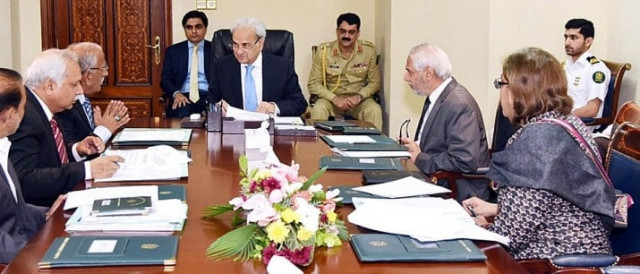Cabinet okays plan to curb terror financing
Pakistan needs to comply with a 26-point FATF action plan to get off the task force’s ‘grey list’

Prime MInister Nasirul Mulk at a meeting. PHOTO: APP
Pakistan needs to comply with a 26-point Financial Action Task Force (FATF) action plan to get off the task force’s ‘grey list’ over the next 15 months.
The plan was approved last month in a meeting chaired by caretaker Prime Minister Nasirul Mulk, official documents showed.
According to documents, the federal cabinet authorised the Ministry of Finance to bolster the Financial Monitoring Unit (FMU). The ministry was also empowered to suggest changes in the Anti-Money Laundering Ordinance of 2010 and Foreign Exchange Regulation Act of 1947, increasing punishments and penalties to curb currency smuggling, one of four main areas of FATF concerns.
Taskforce brainstorms plan to stem terror financing
Sources said that Pakistan’s existing institutional framework was incapable of enforcing the action plan that needed to be implemented by September next year.
The action plan’s implementation will determine if Pakistan remains on the FATF ‘grey list’.
Nine of the conditions highlight concerns expressed in the UN Security Council resolutions. Eight more relate to commitments addressing concerns regarding prosecution terrorism financing cases while four are about curbing cross-border currency movements and five recommendations relate to improving the supervision mechanisms of banks and companies.
The country would have to implement all conditions within 15 months. Originally, FATF wanted to allow just nine months for full compliance.
The cabinet was informed that the FMU was working below its capacity because of a shortage of staff to oversee policy implementation relating to anti-money laundering and countering financing terrorism.
The finance ministry had requested the cabinet to allow it to create more positions besides filling the existing posts. The cabinet allowed to appoint a full-time director-general of FMU, hire more people and set up its sub-office in Islamabad.
FMU is based in Karachi and an executive director of the State Bank of Pakistan (SBP) is looking after the DG’s performance. The FMU is responsible for enforcing the AML and CFT framework and coordinating with global bodies on implementing FATF recommendations.
This week, the National Counter Terrorism Authority (NACTA) also expressed its inability to prepare the National Risk Assessment Report because of capacity constraints.
FIA and NACTA will now jointly prepare the report that is critical for documenting actions taken by Pakistan to curb terror financing.
Upgrading of border posts was allowed by the cabinet to enhance vigilance and deal with currency smuggling and illegal movement of people across borders.
Following the cabinet’s nod, the FMU has sent a draft bill to the ministry of finance to amend the AML Ordinance of 2010 and Foreign Exchange Regulation Act of 1947, making these laws more stringent with stiffer penalties.
These bills will be moved in the Parliament after the new government comes into power.
Pakistan enacts ambitious reforms to comply with FATF
According to the existing law, any person committing the offence of money laundering was liable to serve an imprisonment term of up to 10 years and pay a fine which may extend to Rs1 million and forfeiture of property.
It has also been decided to set up a General Committee headed by the Secretary Finance and make the Inter-ministerial National Executive Committee on Money Laundering headed by the Finance Minister more effective to address AML challenges.
Another proposal was to set up a national steering group to ensure timely implementation of policies and FATF-related actions.
The federal cabinet was informed that a number of milestones on the FATF’s 26-point Action Plan were related to provincial police and home departments, which also required coordination with the Ministry of Interior, FIA and other authorities concerned.
It was also decided to improve the coordination between the federal and provincial authorities to enforce the action plan within the stipulated timeframe.



















COMMENTS
Comments are moderated and generally will be posted if they are on-topic and not abusive.
For more information, please see our Comments FAQ